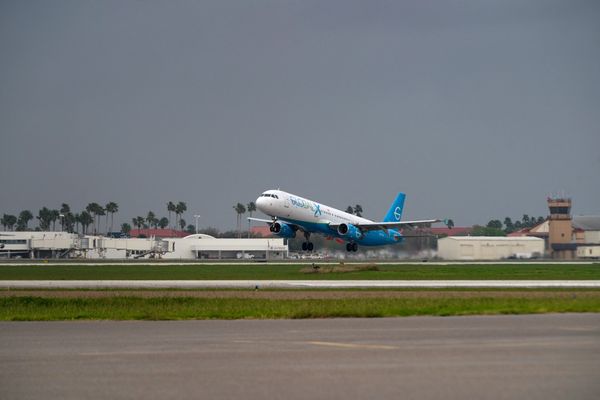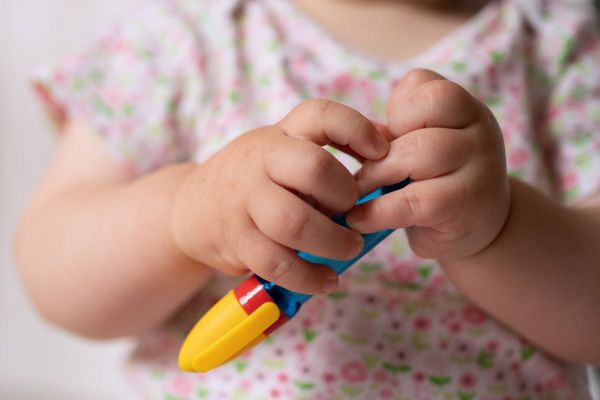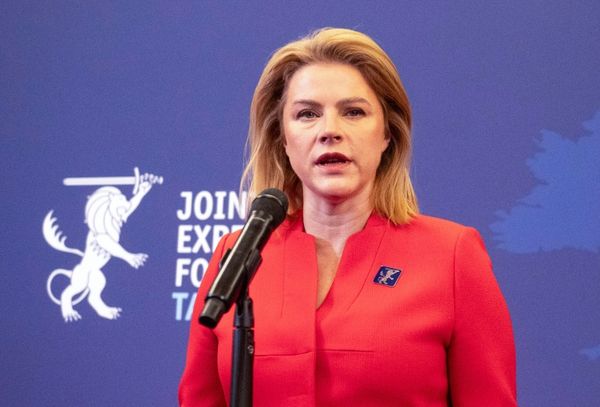Charlie Veron is practically a human fish. He would never come to the surface if he didn't run out of oxygen. He would live down there in an underwater garden at one with the fish and the other busy marine life.
Dr Veron has spent the past 50 years diving around coral reefs, observing, absorbing, enveloped by nature, at home in some of the most remote places on Earth. And every single time he dives, "I see stuff I have never seen before. It is unending."
A living reef, he says, is "really noisy".
"You can hear all the snapping shrimp and all the fish and other organisms communicating acoustically with each other. Things chatting away to each other. It's like being in the middle of a city."
Most of all, he likes it at night. Torch turned off, sitting alone on the bottom of the ocean on an outer reef when the Moon is bright. "Everything is either silver or grey. It is just absolute, absolute beauty."
When he first started diving the Great Barrier Reef in 1972, Dr Veron says, it was an "otherworldly experience", a place teeming with life.
Now, in places, it is silent, "like a tomb. All you can hear are the bubbles from your regulator".
He was in a state of depression about the degraded, dying reef when, four years ago, he joined a scientific expedition to the remote far northern Great Barrier Reef, a 1,000-kilometre stretch from Port Douglas to Cape York.
There, among all the dead coral, they found a perfect living coral garden. "It is incredible," Dr Veron said coming out of the water. "This place is not done yet that is for sure."
There was elation, there was hope and there was inspiration. There had to be a way of preserving the reef.
Now Dr Veron is at the heart of a bold plan to collect one of every species of coral on the Great Barrier Reef to create a coral biobank or "coral ark".
"They can be used when the technology is right to repopulate the reefs," Dr Veron says. "There's no plan B, that's it. If we don't do it, it's all over."
Bringing corals to the surface
The federal government and scientists agree the greatest threat to the Great Barrier Reef is climate change.
When the water is too warm it upsets the symbiotic relationship between coral and its resident algae, causing bleaching.
The latest report by the Intergovernmental Panel on Climate Change (IPCC) states coral reefs worldwide will be mostly wiped out by a 1.5-degree Celsius rise in temperature. On current projections, that grim milestone will be reached in 2035.
It makes preserving the biodiversity of the Great Barrier Reef all the more important. If the corals can be collected and kept alive in aquariums for posterity, they will not be lost.
Great Barrier Reef Legacy managing director Dean Miller says coral is perfect for a biobank.
"Corals are very good at staying alive," Dr Miller, a marine biologist, says.
"They can do that for hundreds, if not thousands, of years under the correct conditions. They asexually reproduce or clone themselves. And so in six to 12 months, they'll double in size."
The 85 species of coral already collected are housed in a commercial aquarium in Cairns, with ambitious plans for a state-of-the-art facility in Port Douglas.
Fragments of these corals are microchipped and sent out to aquariums throughout the world.
For such a monumental conservation project, Dr Miller says: "You need a Charlie Veron."
"Without a Charlie, you have no idea what species of which you are bringing out of the water," Dr Miller says.
"Charlie is one of a handful of people around the world who can actually identify corals to a species level underwater. In fact, he is the best person on the planet to be able to do this.
Dr Miller says Dr Veron is the "rock star of the coral reef world".
"We are never going to see that level of skill and expertise ever again," he says.
Everything Dr Veron has done has brought him to this remarkable moment.
Born to love nature
Dr Veron has been awarded the prestigious Darwin Medal for his work on coral evolution, and he has discovered more than 20 per cent of the world's coral species.
But it is a race against time. Not just the rate at which species are dying, but because Charlie Veron is 77 years old.
"He's very agile, like a young diver," Mr Miller says. "Very old school and not much stops him, a tough old bugger. But he's not going to be able to do this forever."
For his part, Dr Veron — often called the godfather of coral — is only half joking when he says he has been trying to retire for "at least 20 years". And he says: "It doesn't look like it's getting any closer."
As eminent a scientist and naturalist he is now, Dr Veron's life could have turned out very differently.
For a start, his given name is John, not Charlie. He was born, he says, to love nature.
"There's never been an instant in my life where I didn't want to escape into the natural world," he says. It was an obsession from an early age and still is.
As a child on summer holidays at the beach, he collected things from rock pools, even a highly venomous blue-ringed octopus. He named it Ocky.
He kept "everything under the Sun, fossils and snakes" in the family garage. He would cause alarm by taking insects to school, including scorpions and once a funnel-web spider.
"She was called Spooks, this great big spider, and my teacher said, 'Charles Darwin, get that out of here.'" From that day on he was called Charlie.
But school was unmitigated hell. "I mean really, seriously terrible." He has always thought differently to other people.
"I was a walking encyclopedia, not only about the natural world, about anything that interested me. But I can't be taught," he says. He lived in his own world and couldn't pay attention.
He was asthmatic and the stress caused him to stutter. "So, I couldn't play sport. I was this kid who couldn't speak, couldn't play sport, was at the bottom of every class, my self-esteem wasn't too good. I didn't learn anything. I would have been better off never going to school," Dr Veron says.
He became two people; one the hopeless school kid and the other the nature-loving kid who "knew everything that was interesting". That inner world was his home.
After he barely scraped through the leaving certificate — "I got the worst possible pass" — repeated the year with similar results, there was the looming question of what he would do when he left school. "Nobody had any idea," Dr Veron says.
Fed up with failing exams, he didn't want to go when there was a group of psychologists running an IQ study with the chance of a university place. His father persuaded him to do the tests and Charlie performed brilliantly.
He would be offered a scholarship to do anything he wanted at any university in Australia. "We think you are a gifted child," he was told. Charlie thought they had the wrong person.
He chose the University of New England because "it was the closest thing to the bush". Here he was "reborn", undertaking a Bachelor of Science in life sciences, zoology and botany.
His stutter and his asthma vanished. He suddenly became athletic, taking up running.
With no background in marine biology but having a scuba diving qualification, he won a research fellowship at James Cook University at Townsville, studying the Great Barrier Reef. "I was absolutely stunned by it," he says. "The whole thing was more alive than anything I had experienced before."
He was given free rein and a blank check to dive on the reef, a three-year job to monograph the corals, which were then virtually unknown. "It was the job description from heaven. I probably saw more of the reef than anyone ever has before." Taking diving field trips to every corner of the reef, his work was pioneering.
Dr Veron has authored more than 100 scientific articles, including 14 books and monographs.
Coral bleaching 'scared the hell out of me'
In the early days, Dr Veron had thought the reef was indestructible. The 1975 declaration of the Great Barrier Reef Marine Park saved it from oil mining and drilling. In the 1980s the major threats were pollution from coastal areas and crown of thorns starfish. "I thought there wasn't any human threat. I felt it was big enough to look after itself," Dr Veron says.
But the ominous signs were there. "I saw coral bleaching on the reef in 1980. I knew what it was," Dr Veron says.
Over the following decade, scientists made increasing links between climate change and coral bleaching. The summer of 1997-1998 was the hottest on record and by then the alarm bells were ringing.
Dr Veron, who had briefly been a climate sceptic, says "it scared the hell" out of him. He did what he had always done: He read all the science, he joined all the dots and wrote another book, A Reef in Time, The Great Barrier Reef from Beginning to End.
In 2009 he was summoned to an emergency meeting of the Royal Society in London, and introduced by David Attenborough to an audience of the world's most eminent scientists.
"That talk was the first of its kind in the sort of depth where it delved into all the known science and the projections, and I've realised for the first time that it wasn't just about coral reefs — it was about the entire ocean ecosystem going down," says friend and underwater cinematographer David Hannan.
Dr Veron admits he lost some friends over it. "Yes, I do ruffle feathers and I do get attacked for it, but I really don't care," he says.
"I'd care if I was wrong."
In a state of devastation, he was sounding the alarm in the media, to scientists, to politicians, across the world. The natural recluse felt he had no choice but to shout as loud as he could. It took a while for the rest of the world to catch up.
World leaders are gathering in Glasgow next month for the UN Climate Change Conference, or COP26, in what is being hailed as "the world's best last chance" to get the climate emergency under control.
No retirement plans yet
Charlie Veron gets the same sense of joy and wonder being in a rainforest as he does on a reef; embedded in nature. "And if someone else is going to start talking I just want them to go away because I want to be in the rainforest by myself," he says.
In what he describes as a "climate-change move", he and his family have moved from Townsville and bought land in the Atherton Tablelands. "We're going to be planting 20,000 to 40,000 trees" as part of a corridor that connects the rainforest on their property to the adjoining World Heritage area.
When not planting trees, he and partner Mary are putting together a website that captures his entire life's work.
Dr Veron is trying to transfer his entire living career so that anyone can identify corals.
Sometimes he wishes he hadn't started this enormous project. "It's taken so much work" and he struggles for funding.
And there is the "big, big" job of selecting and collecting the corals for the biobank, the "insurance policy" for the natural world that has been failed by humans. "It makes so much sense that it would be absolutely negligent not to do this," Dr Veron says.
"We're looking decades, centuries ahead. And that's what really counts. Everything is worth trying. It's one of the joys of my life to see this happening."
Watch Australia Story's The Godfather of Coral on iview and YouTube.







